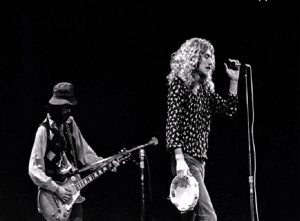The 8 Biggest Icons Of Classic Rock

AC/DC's music video for "Shot In The Dark" - AC/DC / Youtube
The realm of classic rock is a hallowed ground in the world of music, a domain where timeless melodies, electrifying performances, and iconic personalities converge to create a legacy that resonates across generations.
Within this pantheon of musical greatness, there exists a select group of individuals and bands whose contributions have transcended time. These titans of classic rock have not only sculpted the sonic landscapes of their eras but have also become the embodiment of the artistic expression of their time.
Their names are synonymous with the genre itself, and their songs continue to reverberate through the airwaves, reminding us of the enduring power of rock ‘n’ roll. Some of them are characterized by their signature songs, while others are distinguished by how other artists fervently emulated their sound.
A handful of individuals span across multiple entries, appearing both individually and as integral components of larger groups. Certain artists adhered unwaveringly to their musical principles, exuding remarkable consistency; conversely, some seemed to pivot directions as frequently as they changed stages on whirlwind global tours.
And then there are those that emerge like shooting stars – their brilliance burns brightly but is extinguished far too soon.
Elvis Presley, King of Rock and Roll
Elvis Presley, the name itself evokes an instant image of a young man with slicked-back hair, a charismatic smile, and an unmistakable voice that set the world on fire. But what makes Elvis truly iconic? It’s a combination of his exceptional talent, groundbreaking impact, and cultural influence that continues to hum its way to the hearts of new generations of fans.
Elvis didn’t just sing songs; he breathed life into them. His voice held an emotional depth that could range from the sultry tones of “Love Me Tender” to the electrifying energy of “Jailhouse Rock.” With his unique fusion of rock, gospel, and rhythm and blues, he birthed a new genre that would shape the course of music history.
Beyond the music, Elvis represented a seismic cultural shift. In an era of societal rigidity, his uninhibited dance moves and rebellious style challenged norms and ignited a revolution in youth culture. His televised performances were a cultural phenomenon, capturing the hearts of young and old alike and showcasing the transformative power of music as a unifying force.
Pink Floyd, Architects of Sonic Landscapes
In the complex aural tapestry that is progressive rock, one name stands as a towering monolith of innovation and sonic exploration: Pink Floyd. With a career spanning decades, this British band has left its own majestic brick in the walls of our consciousness.
The band is celebrated not only for their mesmerizing soundscapes but also for their thought-provoking concepts that pushed the boundaries of the rock genre.
At the heart of Pink Floyd’s musical essence lies their ability to craft sonic journeys that transport listeners to uncharted territories. Tracks like “Shine On You Crazy Diamond” and the iconic album The Dark Side of the Moon are meticulously woven mosaics with layers of sound that ebb and flow like a river of emotion. Their mastery of atmospherics, combined with haunting lyrics, creates an immersive experience that lingers in the mind long after the music stops.
What truly sets Pink Floyd apart is their conceptual brilliance. Their albums were more than mere collections of songs; they were thematic explorations that delved into profound subjects. From the existential ponderings of Wish You Were Here to the dystopian warnings of Animals, Pink Floyd’s music offered a window into the human experience, sparking contemplation and discourse.
Jimi Hendrix, Guitar Virtuoso and Musical Visionary
In the vast sphere of rock music, few names shine as brightly as Jimi Hendrix. Revered as one of the greatest guitarists of all time, Hendrix’s legacy is burned not only in the notes he played but also in the revolutionary spirit he brought to the music industry.
Hendrix’s guitar skills were nothing short of trailblazing. His ability to coax an astonishing range of sounds from his instrument, often with unconventional techniques like playing with his teeth or behind his back, elevated the electric guitar to new heights.
Tracks like “Purple Haze” and “Voodoo Child” showcased his mastery of both melody and raw, blistering energy, leaving audiences awestruck. Hendrix redefined the possibilities of what a guitar could do.
But Hendrix was more than a guitar virtuoso; he was a musical visionary. His genre-defying fusion of rock, blues, and psychedelia created a musical panorama that was both mesmerizing and otherworldly. His music wasn’t just meant to be heard; it was an immersive experience that transported listeners to new dimensions of sound and emotion.
AC/DC, Masters of Rock Power and Resilience
When the thunderous riffs of “Back in Black” ring out, there’s no mistaking the phenomenal sound of AC/DC. This legendary Australian rock band has slowly sculpted its own throne in rock, becoming synonymous with electrifying performances, timeless hits, and an unwavering spirit.
AC/DC’s influence is built upon their signature hard rock sound that packs a punch like no other. With Angus Young’s scorching guitar riffs, Brian Johnson’s distinctive vocals, and a rhythm section that could shake the very foundations of a stadium, their music is a sonic assault that has left audiences electrified for decades. Tracks like “Highway to Hell” and “Thunderstruck” are anthems that bridge generations, embodying the essence of rock ‘n’ roll rebellion.
But AC/DC’s impact goes beyond their music. Their resilience in the face of adversity, including lineup changes and personal tragedies, is a testament to their dedication to the craft. They weathered storms with an unshakable resolve, and their ability to persevere and continue delivering high-octane performances is a testament to their enduring legacy.
AC/DC’s influence reaches far and wide, with their music inspiring countless bands and their ethos of living life to the fullest resonating with fans around the world. They’ve solidified their place in rock history as more than a band; they’re a force of nature, a symbol of unrelenting energy and the power of music to unite and ignite the soul.
Bob Dylan, Folk’s Poetic Troubadour
Iconic is an understatement when it comes to describing the impact of this American singer-songwriter. Bob Dylan’s influence transcends genres, generations, and societal norms, solidifying his status as one of the most celebrated and recognizable figures in the world of music.
Dylan’s place in rock history is rooted in his groundbreaking songwriting. His lyrics are not mere words; they are poetic verses that delve into the human experience, addressing complex themes of love, protest, freedom, and the intricacies of life itself.
Tracks like “Blowin’ in the Wind” and “The Times They Are a-Changin'” became anthems of the civil rights and anti-war movements, harnessing the power of music to ignite social change.
His chameleon-like ability to reinvent himself has further cemented his status as a legendary musician. From his early folk troubadour days to his electric transformation, Dylan’s evolution challenged expectations and inspired countless artists to follow their own creative paths. His voice, characterized by its distinctive rasp, carries an authenticity that cuts through pretense, captivating listeners with its raw emotion.
The Bard’s influence extends beyond music. His Nobel Prize in Literature solidified his position as a literary force, showcasing the depth of his storytelling and lyrical prowess. He remains a voice for generations, a sage whose words continue to resonate in an ever-changing world.
Queen, Champions of Showmanship
There are probably a few select songs in memory that can topple Bohemian Rhapsody’s opening line “Is this the real life? Is this just fantasy?”. This song took generations of rock listeners on an unforgettable musical journey that almost no other song has been able to replicate.
And the masters behind this song are the members of Queen, a name that needs no introduction. Renowned for their musical virtuosity, anthemic hits, and electrifying performances, the UK band’s legacy is extended beyond the walls of their studio but also into the hearts of millions of fans around the world.
Queen’s unparalleled musicianship and innovative approach to songwriting what what most people remember. With Freddie Mercury’s astonishing vocal range, Brian May’s intricate guitar work, John Deacon’s pulsating basslines, and Roger Taylor’s thunderous drumming, Queen crafted a sound that transcended genres.
Apart from “Bohemian Rhapsody,” a six-minute masterpiece that defied conventions, the band had also hits like the anthemic “We Will Rock You” and the melancholic “Love of My Life”. Their popular discography showcases their ability to blend diverse influences into auditory artworks that remain timeless.
But beyond their musical capability, Queen’s stage presence and showmanship were a league of their own. Their concerts weren’t mere performances; they were spectacles that blended music with theatrics, captivating audiences with elaborate set designs, lighting, and Mercury’s magnetic charisma. The Live Aid performance in 1985, often hailed as one of the greatest in rock history, exemplified their ability to command a stage and unite a global audience for a cause.
Led Zeppelin, Wizards of Hard Rock
Led Zeppelin’s assortment of rock divinities was one of those that the rock gods must have arranged. The band’s ingenious fusion of blues, rock, and folk influences created a sound that was the melting pot of Robert Plant’s haunting vocals, Jimmy Page’s intricate guitar solos, John Paul Jones’ versatile bass and keyboard work, and John Bonham’s thunderous drumming.
These rock ‘n’ roll royalties, did not just carve a rock-steady niche in the annals of music history; they stomped and hammered hard on it. Their iconic status isn’t just a result of their chart-topping hits; it’s a testament to their unmatched musical prowess, genre-defying sound, and a legacy that continues to inspire and captivate.
Tracks like “Stairway to Heaven” and “Whole Lotta Love” showcase their ability to craft intricate compositions that seamlessly shift between delicate melodies and thundering riffs.
But Led Zeppelin’s impact extends beyond their studio recordings. Their live performances were legendary, often evolving into epic jam sessions that showcased their improvisational brilliance. Their concerts were not mere spectacles; they were immersive experiences that left audiences in awe, a testament to the band’s stage presence and intuitive chemistry.
The Beatles, Pioneers of Pop Revolution
When discussing the most iconic figures in the realm of music, one name stands head and shoulders above the rest: The Beatles. Their influence is immeasurable, their impact unparalleled, and their legacy continues to shine as brightly as ever, decades after their heyday.
The dynamic collaboration of John Lennon, Paul McCartney, George Harrison, and Ringo Starr created a sound that blended rock ‘n’ roll with pop sensibilities, giving birth to a new era of music. Hits like “Yesterday,” “Let It Be,” and “Hey Jude” showcased their ability to produce melodies that resonate across generations, while tracks like “A Day in the Life” pushed the boundaries of what a song could be.
Yet, The Beatles’ impact goes beyond their infectious melodies. They were cultural trailblazers, reflecting and shaping the spirit of the times. From their famous appearance on “The Ed Sullivan Show” to their exploration of Eastern spirituality and their involvement in the counterculture movement, they became symbolic figures of a generation seeking change and freedom.
The Beatles’ music remains as fresh and relevant today as it was during their meteoric rise. Their enduring appeal is a testament to their ability to capture the essence of human emotion and experience, transcending barriers of language, culture, and time. The Beatles aren’t just a band; they’re a phenomenon that redefined music and culture.



















